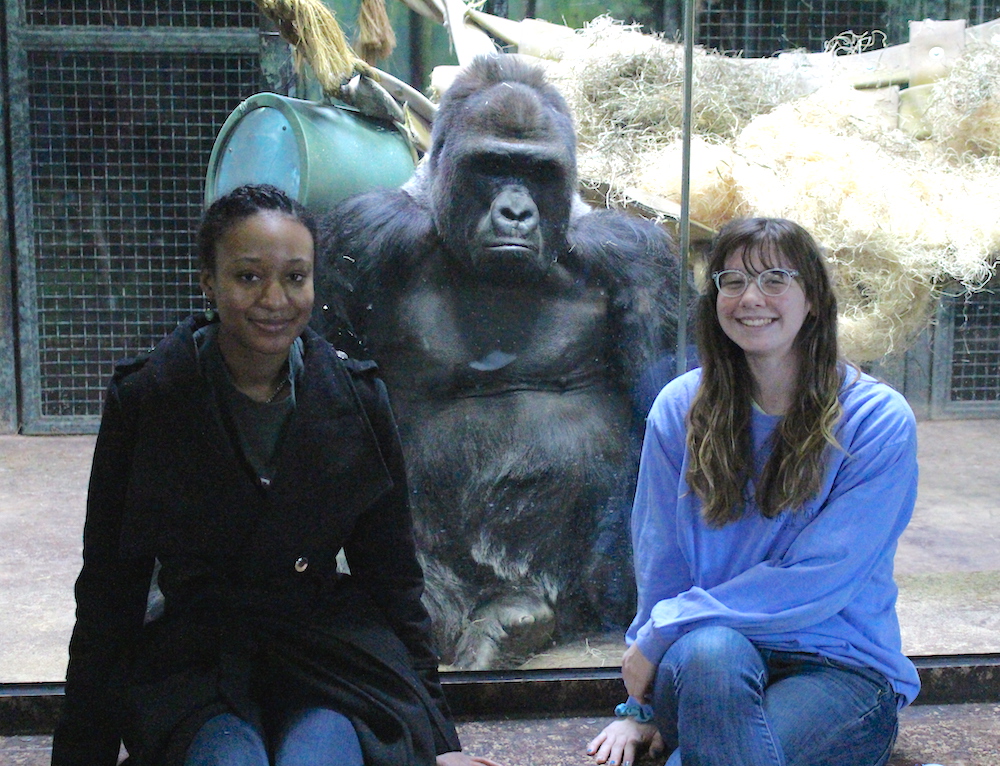Animal Studies Scholars Spend Spring Break at Louisville Zoo
March 29, 2019

BLOOMINGTON, Ill. –– While most Illinois Wesleyan University students spent Spring Break with friends and family, a group of Animal Studies Scholars decided to spend theirs with primates.
Led by Assistant Professor of Psychology Ellen Furlong, the scholars spent break observing and enriching the lives of primates at the Louisville (Kentucky) Zoo. During their Spring Break Immersion, the students put into practice some of the things they learned while enrolled in a Gateway Animal Studies course during the fall semester through the construction of enrichment activities for the primates.
Enrichment items are essentially toys for the animals which simulate the problems and activities they encounter in the wild.
“Many of these simulate how animals might forage or navigate their environments,” said Furlong.
The students conducted research in advance so they could best predict what the animal would enjoy and how it would interact with the item. Each enrichment item was tailored specifically for the animal in mind. Nursing major Raven Robinson ’22 and her group were assigned the Colobus monkeys.
“The students in my group thought about how the Colobus monkeys would most likely enjoy an enrichment that encourages them to climb, swing and jump,” explained Robinson. “We decided to create a ladder and a separate contraption that the monkeys would be able to interact with.”
Along with constructing the enrichment activities, the students also gained firsthand knowledge on the ethics of zoology.
“When we have animals in captivity, we owe them something: at the very least we owe them the ability to live their animal lives as best they can,” said Furlong. “Reputable zoos (like the Louisville Zoo) do a lot of good work to this effect, but the time and resources of the zoo keepers are limited. My students and I regularly visit the Louisville Zoo to spend a week building enrichments for the animals to help the zoo meet their goals for ethical animal care.”
Once the students completed construction, they were able to introduce the enrichment items to the animals and observe their behavior.
“The major takeaway the students learned was that animals need to be stimulated and engaged in the same way that humans do,” said Robinson. “In some cases, the animals did not always utilize the enrichment in the way that we expected, so it was a memorable experience to figure out how all animals operate in very remarkable ways.”
This year’s immersion was complicated by the formation of a football field-sized sinkhole in the zoo. Luckily, this formed in an area with no animals or people, so there were no injuries. However, this did mean that the zoo was closed to the public during the students’ time there.

“We couldn’t spend as much time observing the animals as we wanted, as we had to be escorted around the zoo,” explained Furlong. “However, when we were around the animals it was extra special for the students since there were no other visitors there. It was in some ways like our own private tour.”
The Animal Studies Scholars partnered with Bloom Community School this year and were accompanied by nine elementary and middle school students, their head teacher Grace Sheese, and a few parents. The Bloom students also conducted research in advance of the trip, and everyone worked together to engage and support the animals.
By Megan Baker ’21